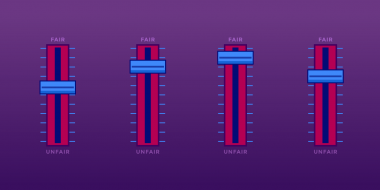Our digital future depends on our ability to access, use, and build on technology. A few media or political interests shouldn’t have unfair technological or legal advantages over the rest of us. Unfortunately, litigious copyright and patent owners can abuse the law to inhibit fair use and stifle competition. Internet service providers can give established content companies an advantage over startups and veto the choices you make in how to use the Internet. The Electronic Frontier Foundation fights against these unfair practices and defends digital creators, inventors, and ordinary technology users. We work to protect and strengthen fair use, innovation, open access, net neutrality, and your freedom to tinker.
In principle, intellectual property laws (or IP law, a catchall term for copyright, patents, and trademarks) should serve the public in a number of ways. Copyrights provide economic incentives for authors and artists to create and distribute new expressive works. Patents reward inventors for sharing new inventions with the public, granting them a temporary and limited monopoly on them in return for contributing to the public body of knowledge. Trademarks help protect customers by encouraging companies to make sure products match the quality standards the public expects.
See MoreUnfortunately, our IP regimes have strayed far from their original purposes. Too often, protections for free speech and innovation are seemingly forgotten as soon as someone cries “infringement.” An unproven allegation that your video or blog post infringes copyright, or that your domain name infringes someone’s trademark, can be enough to shut down perfectly lawful speech. A patent troll can kill a small company with a bogus lawsuit based on a questionable patent that shouldn’t have been issued in the first place.
Some of these laws simply haven’t adapted well to modern technology. A warped development in copyright law has made it illegal in many countries to modify or even look at the software built into the products you own, even if you’re doing it for completely lawful purposes. Copyright’s legal reinforcement of digital locks, paired with extreme criminal penalties for infringement, has intimidated a generation of would-be researchers, tinkerers, and inventors. And ongoing expansions of copyright law are often decided in secret, closed-door meetings before the public is ever allowed to debate them
Imbalanced copyright law—and overzealous enforcement—generally favors powerful voices that have a great deal of influence in culture. Extreme copyright laws can intimidate new types of creators, especially those who use new media techniques to criticize dominant culture or powerful entities. Online platforms that support new, independent creators can only thrive when they don’t risk severe legal repercussions for their users’ activities. Similarly, when only the most privileged members of society have access to up-to-date research, only those members can build on that research to create new ideas and inventions. That’s why EFF supports open access to research, so everyone can build on and contribute to our knowledge commons.
Just as new voices can’t thrive if copyright law doesn’t recognize their rights, new players must also have access to the same resources as established ones. When Internet service providers can give preferential treatment to certain content or hardware companies, those technologies harden to the accelerating effect of competition and users can’t access new sources of information and innovative new services. EFF believes that Internet users should have the freedom to use technology however they like without service providers artificially restricting their experience.
Whether we’re fighting patent trolls in court; arguing in Congress for more balanced copyright laws; or urging governments, funders, and educational institutions to adopt open access policies, EFF is committed to building a society that supports creativity and innovation, where established players in the marketplace for technology and culture aren’t allowed to silence the next generation of creators.
See LessCreativity & Innovation Topics
- Fair Use
- Analog Hole
- Blockchain
- Broadcast Flag
- Coders' Rights Project
- Competition
- Copyright Trolls
- COVID-19 and Digital Rights
- Defend Your Right to Repair!
- Digital Radio
- Digital Video
- DMCA
- DMCA Rulemaking
- DRM
- Electronic Frontier Alliance
- File Sharing
- Fixing Copyright? The 2013-2016 Copyright Review Process
- Hollywood v. DVD
- How to Fix the Internet: Podcast
- Mobile devices
- Net Neutrality
- No Downtime for Free Speech
- Open Access
- Patents
- Reading Accessibility
- Reclaim Invention
- Right of Publicity
- SOPA/PIPA: Internet Blacklist Legislation
- Terms Of (Ab)Use
- Test Your ISP
- The "Six Strikes" Copyright Surveillance Machine
- The Public Interest Internet
- Trademark
- Trusted Computing
- Video Games
- Article 13
Creativity & Innovation Highlights
Reclaim Invention
Copyright Law Versus Internet Culture
Throughout human history, culture has been made by people telling one another stories, building on what has come before, and making it their own. Every generation, every storyteller puts their own spin on old tales to reflect their own values and changing times.
This creative remixing happens today and...
Ninth Circuit Sends a Message to Platforms: Use a Moderator, Go to Trial
After almost two decades of litigation, you’d think the contours of the Digital Millennium Copyright Act (DMCA) safe harbors would be settled. But the cases just keep coming, and while the overall trend is pretty favorable, the latest ruling takes an unfortunate turn (PDF).
The...






